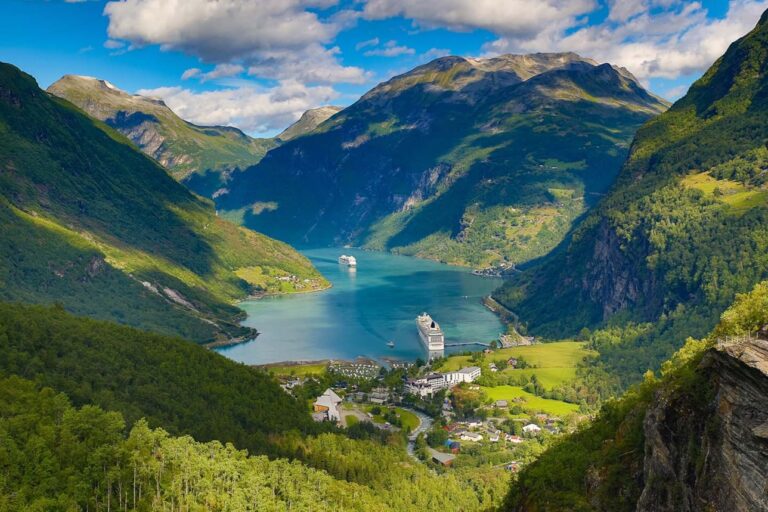
On December 13, 2023, the Norwegian Maritime Authority announced its recommendations for regulations for achieving zero emissions in the UNESCO-listed West Norwegian Fjords. Helge Hermundsgård, business development manager at DNV Maritime, elaborates on the implications of these regulations for cruise operators.
What is the background of these rules?
Two of the West Norwegian Fjords, the iconic fjords of Nærøyfjorden and Geirangerfjorden, were added to UNESCO’s World Heritage List in 2005. Norway is entrusted with conserving these areas. In 2022, the Ministry of Climate and Environment tasked the Norwegian Maritime Authority (NMA) to devise plans for achieving zero emissions from cruise ships, tourist boats and ferries in these World Heritage Sites and their surrounding fjords by 2026 at the latest, aligning with a parliamentary resolution. The new rules would only permit ships that used zero-carbon fuels to enter the fjords, which would have excluded most cruise vessels from sailing there. A supply chain for the needed amount of zero-carbon fuels will not be in place by 2026 and needs time to gradually develop. For the affected travel destinations, this would mean a noticeable decline in their tourism income. So, there was massive feedback from the affected industries.
Has the feedback been heard by the Ministry of Climate and Environment?
The NMA has revised its proposal for the zero-emission regulation, which is not yet final and needs government approval. The proposal has two alternatives, both of which allow some use of biofuels until 2035, but with different criteria and conditions. The NMA recommends the second alternative, which is more flexible and in line with most of the feedback received from the cruise industry. A final decision and wording are expected by the end of Q1 in 2024.
Can you elaborate on the alternatives?
Alternative one retains the zero-emission target and accepts biogas in a transitional 10-year period, but also allows using the EU’s mass balance approach for biogas as provided in the Renewable Energy Directive (RED). This means minor changes, but a more practical application during the transition period. Alternative 2 proposes to retain the zero-emission target but also accepts using liquid biofuels such as bio-diesel or bio-methanol for a transitional period up until December 31, 2035, using the definitions of and requirements for fuel sustainability etc. in RED and FuelEU Maritime. This is broadly aligned with the majority of comments made during the hearing. For biofuels, this means the basic sustainability requirements in the RED need to be met, along with at least 50%–65% GHG savings depending on the age of the fuel production facility. For renewable fuels of non-biological origins the requirement is at least 70%. To follow this transitional approach, ships must buy enough alternative fuel to match the energy they use in the affected area, even if they don’t use it there. They must show proof of buying enough alternative fuel before they enter the fjords, and the Port State Control may check this proof when they are operating there or later.
What does that mean for cruise operators planning to schedule tours to Norway’s World Heritage fjords from 2026 onward?
Cruise operators who want to sail in these fjords from 2026 on will have to comply with the zero-emission regulation, either by using zero-carbon fuel or by buying enough alternative fuel to match their energy consumption in the regulated fjords. They will also have to provide proof of their fuel purchase and be ready for inspection by the Port State Control. Depending on the final decision of the government, the alternative fuel may be limited to biogas or include other liquid biofuels that meet certain sustainability and GHG-saving criteria.
How should cruise operators prepare?
As it is only two years until the expected entry into force date and itineraries are planned a long time in advance, shipowners should check the fuel capabilities of their vessels. If they have technically capable vessels, shipowners should verify whether they will be able to secure the needed amount of biofuel. Preferably this is certified to prove their emission release. If none of these requirements can be met, cruise operators will unfortunately need to change their itineraries, potentially resulting in fewer port calls in general and the destinations losing income, which was feared. A final remark, looking into the future regulation for the World Heritage Sites and their surrounding fjords, we would recommend aligning this with the planning for compliance with FuelEU Maritime. The reduced carbon in the regulated fjords could be used in a pooling strategy for vessels operating in EU waters.
To find out more about DNV Maritime’s latest developments in the electric and hybrid marine technology industry, click here.



